
25 minute read
Q&A: Al Jazeera’s Duncan Preston
A LIFE IN PICTURES
As Head of Global Creative at Al Jazeera, in Qatar, awardwinning Duncan Preston is responsible for all the branding and design at the English language channel. The Visual Communications graduate tells WLV Life about his career so far.

LM: What stood out about the Visual Communications degree at Wolverhampton that made you want to study there?
DP: I looked around quite extensively at a number of graphic design courses across quite a few universities and was offered places at Central St Martins, Goldsmiths (and a few others), but settled on Visual Communication at School of Art and Design for a number of reasons.
When I visited Wolverhampton and the University for my interview, I really liked the overall atmosphere. There was a real creative energy and a buzz about the place and it felt very comfortable.
The course also stuck out for me: it was ranked as one of the best in the UK and the

syllabus covered the whole spectrum of design, as well as multi-media, web design (which was a relatively new emerging technology back then), and it had a highly conceptual backbone.
LM: What are your memories of studying at Wolverhampton?
DP: As I was a mature student I had quite a different outlook from many students, so although uni life is about partying, I had ‘already seen it, done it’. I’m not saying I didn’t party, of course I did, but that just lasted for the first year, after which time I settled back into being me.
My fondest memories have to be of the friends I made. During term time, I lived in a large house
with six other people from the same course. We used to sit and discuss projects, work together, offer advice and ideas, brainstorm and just help each other out.
I don’t really see them anymore, other than glimpses on Facebook, but it’s great to see how they are getting on now and how diverse all our lives have become.
LM: What were the highlights of your studies?
DP: There were many inspiring tutors, including Dave Ashley and Ian Madeley, who taught multimedia, and that was something I really wanted to get into at the time. They also showed a lot of faith and confidence in me, and I remember for our degree show they asked me to create a multi-media interface that was a portfolio database of all the students that took the multimedia modules. It was a great project to work on, and once I had graduated I had to update it because a Malaysian university wanted to use it for their students the following year. That was a real honour and a nice acknowledgment of my work.
LM: How did your studies prepare you for your career?
DP: The course changed my perspective regarding design. It made me realise that great design is not just bashing something out in Photoshop that you may think looks cool just because you know how to use a piece of software a bit. Even the simplest and most straightforward designs come from thorough development of an initial concept. Every mark or direction must be well considered with specific goals in mind and with the aim of playing with the right emotions to achieve the desired actions or reactions. Prior to graduating I’d lived a fairly blinkered and uncomplicated life, I’d never really thought that deeply about anything before.

LM: Has your career progressed as you expected it to?
DP: When I graduated, my aim was to try and get into TV or film. I’ve definitely managed to follow that path, but I hadn’t envisioned it being within the news industry or emigrating to Qatar to work for one of the biggest and most controversial news organisations in the world.
Part of me wishes I had gone down the route of TV entertainment or film because the news industry can be a bit heavy at times: it’s always extremely serious, and being immersed in daily global news events for over 15 years has created a level of desensitisation regarding all the hardships and issues going on in the world today.
LM: Which projects have you done that you are particularly proud of?
DP: I feel pretty lucky to be where I am and in my current role. Over the past 15 years, I’ve had some great opportunities: I’ve played a major role in winning more than 60 industry awards for design and promotion, as well as being given the honour of being on the judging panel for industry award bodies such as: PromaxBDA (Promo and Broadcast Design Awards); The New York Film Festival; and AME awards. Being recognised for my contribution in the field are some of my proudest moments and everything I could ever have wished for.
I started out at Al Jazeera working on the launch of its English language channel. It was a very intensive introduction into the news industry, working 18-hour days, creating the look of a new TV channel. But the pride from finally seeing everything you worked on for a year become realised for the world to see is a feeling that’s hard to beat.
In 2011, I went to Sarajevo to direct a creative team of four, and launch another new Al Jazeera channel, Al Jazeera Balkans. That was a huge challenge: we had to create the entire look of a new channel in only four weeks.
The largest project I’ve worked on was the refresh of Al Jazeera’s English language channel. The refresh was my vision and under my direction, so the full responsibility to deliver and, to deliver well, was solidly on my shoulders.
It was a much harder task than the launch of the channel, mainly because it was not starting from a clean slate; there was legacy and an existing audience that needed to be fully considered.
Everything that you see on the screen was included, starting with the cutting of a new font, to screen furniture and screen architecture, promotional campaigns and promotional signage, the main news studio set, programme branding, as well as core channel branding. No stone was left unturned.
The refresh launched on January 1, 2020 … so far, it’s gone down a storm!
LM: What are your day-to-day responsibilities as Head of Global Creative at Al Jazeera?
DP: I sit at senior management level and manage a global team of about 50 promo producers and designers across London, Washington DC and Doha (Qatar). I’m directly responsible for pretty much everything you see on the screen in terms of branding, promotion, graphics and design for Al Jazeera’s English language channel.
The greatest thing about working at Al Jazeera has to be the team I work with of about 50 people representing about 20 different nationalities! The other thing I love is the freedom. Although it is quite a strict organisation in terms of its channel message and editorial outlook, in terms of design we have a certain level of autonomy. The fun part is designing something that pushes concepts as far as you can without obscuring or diluting the core message.
When award-winning soundtrack composer Alice Trueman first picked up a violin at the age of seven, she would never have believed that music would be central to her life and career.
But now an established composer, having created beautiful soundtracks for radio dramas, short films and a feature film, she is firmly recognised as one of the country’s young creative talents.
Born and bred in Wolverhampton, Alice joined the University in 2000, graduating three years later with a First Class BA (Hons) Music and the Blackwell’s Music Prize. It was during her studies that she began to explore seriously the idea of earning a living as a composer.
“I’d always written melodies for fun, but never thought of becoming a composer before,” says the classically trained violinist. “But my tutors were very inspiring and encouraging and I began to think this might be something I could do professionally.”
A departmental competition to write music for a string quintet, in which she reached the top five, helped to germinate the seed of the idea. She entered further competitions after she graduated, with successes including being chosen as one of the Hottest Young Creatives in the Midlands by Channel 4 in 2005, as well as reaching the finals of the BBC’s Baroque Remixed competition for Postgraduate composers.
These provided money-can’t-buy experiences, such as masterclasses with Ivor Novello award winner Nitin Sawhney and the opportunity to conduct the BBC Concert Orchestra.
With commissions coming in, Alice started to build up a strong portfolio with music for the BBC Radio 4 dramatisation of Solaris, as well as the station’s adaptation of Girlfriend in a Coma by Douglas Coupland. She remained close to the University after she graduated and in 2008 she returned as a guest lecturer in music for
Alice strikes a chord
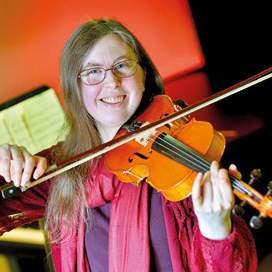
film and other undergraduate modules, which led to her studying for a MMus in Composition and Songwriting. She graduated with Distinction in 2013.
“The University has been really supportive and helped me to start off on the right path and into my career,” she said. “And now I love trying to inspire the next generation of musicians and composers.” In between her work composing soundtracks for corporate and promotional videos, animations and podcasts, she has landed some prestigious commissions for BBC Radio 3 and 4, writing the original music for an adaptation of Chekhov’s The Three Sisters, called Three Sisters Rewired.
Last year she was commissioned to write the score for Art of Now: Migraine – an idea that she pitched to the BBC a few years previously, with Overtone Productions. The arts documentary explored migraine and creativity through the stories of artists and writers who live with the condition and her music followed the journey of a migraine attack. “I wanted to evoke the feeling of a migraine as closely as possible, the feeling of other-worldliness and the isolation of being a migraine sufferer,” explained Alice. “It was three months of intense work and I had quite a few migraine auras while writing it, but it was a great project.”
Working in a musical and creative job is a constant source of inspiration for Alice. “I feel so privileged to be a composer, and so lucky to have had many great teachers and colleagues who have encouraged me along the way.”
When rapper Nate Ethan Watson (N.E.W) was studying for his Public Health degree, he also underwent gender transformation. He tells WLV Life about how his dream to graduate as a man was realised.
NEW life NEW life

’d known for decades that I was in the wrong body – I never felt female and told my friends when I was about seven that I was a boy. When I was younger I didn’t know that I could change and thought I’d always be trapped in a woman’s body.
I suffered anxiety and depression a lot through my life, but music kept me sane and gave me something to focus on. I started writing songs when I was just eight years old and started to perform rap and grime as N’Chyx when I was 18.
However, I struggled with gender dysphoria. It was important to me to keep going, though, and I released singles and four albums as N’Chyx and performed across the country and around the world. When I wasn’t doing that I went back to being a healthcare worker, a job I’d started when I was 19 and which kept me grounded.
It wasn’t until I was 27 that I started to research gender dysphoria and was relieved to find out that what I was feeling was normal. But when I saw a doctor, I was told it was “OK to be a happy lesbian”. That’s not who I was, so

I eventually changed doctors and was referred for psychological assessment. I was devastated to hear it would take years to see someone before I could even start hormone treatment.
When I reached the age of 30, I decided it was my awakening year. I felt a shift happening within me and wanted to make changes in my life.
I hadn’t really thought about going to university before, but it was the people I worked with on the mental health wards told me I should go for it and reach my potential. It was the push I needed and I enrolled at the University of Wolverhampton for what would be the next chapter of my life.
I didn’t realise how difficult it would be to juggle everything: not just studies and my health work, but also my mental health struggles as the need to transition was becoming stronger.
I had it in my head that when I started university I would be able to start transitioning, but the waiting lists for an appointment at the gender clinic were 52 weeks at least for the first consultation, with the prospect of up to 12 months for the second appointment.
I started my studies in 2016 and I’m not sure how I got through the first year as I didn’t tell anyone about my gender dysphoria – I had also been diagnosed with depression – but I surprised myself by finishing it.
When it came to starting the second year, I was so anxious, I didn’t know if I’d be able to continue. Playing on my mind was the fact that I didn’t want to graduate with my birth name on the certificate; it was really important for me to graduate and have my chosen name on it, but the time to get an appointment at the gender clinic meant I was running out of time.
The workload was intense and with my healthcare shifts on top, I was close to giving up on my studies. Only a handful of people, including my parents, knew what I was going through and I knew I had to take matters into my own hands. I started researching private clinics that I could help me to start the transition process.
I found one that was really supportive – I went through all the assessments and after six months I was prescribed testosterone. I started taking the hormones on July 25, 2018.
By the time I went back to start my third year, I was already changing physically and psychologically and my name was now Nate Ethan and all my official documents had my new name on them. I was heading back to university as a man.
I was nervous, but everyone was really supportive. It was a challenging year, though, and I look back now and I don’t know how I did it. I was working 12-hour ward shifts, the last year of the degree studies were intense and I was transitioning.


Some days I really struggled. I went back to my music – it was my escape – and I also confided in a couple of my lecturers, Dr Ranjit Khutan and Bhawna Solanki, about how I couldn’t cope.
They were both amazingly supportive and they counselled me and helped me to keep going.
To my astonishment, I graduated with a First and I was also the first student to win the Pauline Fuller Award for overcoming challenges and adversity. Pauline was a lecturer I have many fond memories of in my first year and was really upset to hear she had passed away. I was more than proud and thankful to receive the award.
Since graduating, I’ve been working as an occupational therapist three days a week as well as working as a healthcare worker on a forensic ward. I’m still performing my music and I’ve also launched a project I created with the support of Wolverhampton LGBT+ Alliance and Inspiring Healthy Choices: TNB (Trans and Non-Binary) Connect provides a safe space for people to collect donated items of clothing. We’ve got some big sports brands supporting us, too, which is fantastic.
I’ve never been happier – I’m doing work I love, I’m writing music and helping to make a difference to the LGBT community in Wolverhampton. The University of Wolverhampton helped me on my journey to who I am now and I’m so grateful.
THE ALUMNA HELPING CHILDREN TO EXPERIENCE GRADUATION It’s not just university students who get to enjoy their graduation days: primary school pupils are also learning what it’s like to wear a cap and gown with pride after completing their hard work.


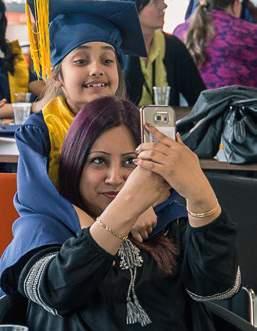
It’s all thanks to the Children’s University – a charity that works with schools to develop a love of learning in children by celebrating participation in extra-curricular activities in and outside of school.
The charity, which is headed by University of Wolverhampton alumna Helen O’Donnell, works with 59 partners across the UK, including further education and higher education providers, local authorities and other organisations in England. The University of Wolverhampton is one.
“It’s heartening to see the University of Wolverhampton working hard to raise the aspirations of the city’s youngsters and being a central part of the local community,” said Helen, who graduated in 1993 with a BA (Hons) Modern Languages.
“The Children’s University was designed as a social mobility tool and is open to all children. It focuses on breaking down barriers, giving children new experiences and helping them to grow in confidence and self belief.”
The University of Wolverhampton Children’s University operates at 42 schools across the Black Country, south Birmingham and Telford, and is part of the national Children’s University Trust™ – a UK-based but international organisation that aims to provide exciting and innovative out-of-school-hours learning activities to children and young people aged five to 14.
Children who take part gain credits for taking part in free or low-cost activities such as sport, cookery classes, choir, dancing, martial arts and visits to museums and community groups. They have a passport where they collect credits through their activities and attend a graduation ceremony to celebrate their achievements.
Helen joined the Manchester-based charity in November 2015 after years of working in the education and third sectors and she’s pleased to be linked once again with the University.

“It’s made me really proud of my former University,” she said. “And because I met my husband in Wolverhampton, it also feels like a family connection.”
Helen studied French and Spanish at University, spending her third year in Barcelona, where she volunteered at the 1992 Summer Olympic Games as a translator and interpreter. While living there she also picked up Catalan and was able to continue learning the language when she returned to Wolverhampton as part of her studies.
“It was a fabulous course and I can honestly say it was the best four years of my life,” she said.
After completing her studies, Helen stayed in the city to be with her husband, a local man whom she met on a night out in the city. They had their first daughter in 1994 and she started work the following year at a local housing corporation.
In 2001, after the birth of their second daughter, she joined Wolverhampton Grammar School as development manager and from there Helen and her family moved to Cheshire to take up the role of development director at her former school, Withington Girls’ School.
Her next role as Head of Development at the University of Liverpool saw her running the John Lennon Scholarship, which was funded by Yoko Ono. Helen’s claim to fame – other than heading the major donor unit where millions of pounds worth of scholarships and appeals were co-ordinated – was that Yoko Ono was her first follower on Twitter (“That’s a really weird thing to say!”).
After having her third child, Helen joined the Cheshire Community Foundation in January 2012, which enabled her to build on her fundraising and grant-making experience.
Now CEO of the Children’s University, Helen has overhauled the charity, making it the success it is today.
“We had to rebuild strategically and have been on that path for quite a while now, but now we have a framework that works well with our schools. It means we’re being more proactive in how we are helping schools on a national perspective,” she said.
“I feel really lucky to be involved with the Children’s University and love it when we hold the graduations for the children where we can celebrate their achievements and it’s great that universities, such as Wolverhampton, play their part.
“All children have high aspirations when they’re young and through Children’s University, the University of Wolverhampton is helping those that might not otherwise get to fulfil them, by setting them on a path to achieving them.
“In other places I’ve met parents who are now doing a degree themselves because they saw their child graduate and I suspect we’ll be meeting some parents doing the same in Wolverhampton in the very near future.”
A+R Alison and Robert Bowen A&R

Robert and Alison Bowen (née Barker) met at the-then Wolverhampton Polytechnic in 1975, when he was studying Modern Languages and she was studying Economics.
They met at a student party in December 1975 and have been together ever since. They married in 1977, just before they both started their final year, graduating in 1978, when Alison was heavily pregnant with their son.The retired couple, who live in Hereford and have two children and three grandchildren, both worked in the public sector.
“We haven’t changed a bit!” said Robert.

J+D Jodie Wells and Daniel Hunt J&D “We are very blessed to have found our After graduating in 2014, Jodie soulmate on that first day at University trained to be an English teacher and in 2011 and absolutely love the story we now teaches at a secondary school in have created so far,” says Jodie Wells. South Birmingham, while Daniel, who
Jodie, a BA (Hons) English and did a BDes (Hons) Product Design Film Studies graduate, and Daniel degree, is now a design engineer. met when they both moved into Kent The couple got engaged in May Halls and quickly became inseparable. 2018 and plan to marry in 2020.
R+L R&L
Rosina Dawe and Luis Gazzelli-Hill
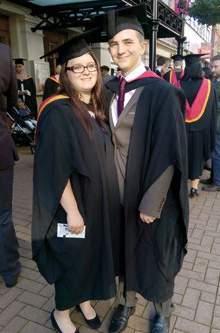
SOUL MATES WHO MET ON CAMPUS
Apparently, one-fifth of students meet the love of their life at university – we catch up with some loved-up alumni whose eyes met across campus.
A mutual friend introduced Rosina and Luiz at the Christian Union in 2014, but it was not until two years later that the friends became a couple.
Rosina, who studied Deaf Studies and Special Needs and Inclusion Studies before completing a PGCE in Primary Training, and Luis, who completed a BA (Hons) War Studies before going on to attain MA in Military History, are now saving to buy their first home together – and hope to adopt a cat. They are both working part time while they look for jobs in their respective fields: Luis hopes to become a published historian and Rosina a teacher. A+G A&G SUMMER 2020
The couple met at Compton Park Thursday night disco in 1987. Debbie, who graduated with a BA (Hons) Business Studies degree with sandwich year, and Chris, who did a BEd, completed their studies in 1991 before becoming teachers.
The couple, who have two daughters, also went on to complete postgraduate studies and Debbie is now head of Transnational Education at the University of Wolverhampton, while Chris is senior developer at Shrewsbury College.
D+C D&C
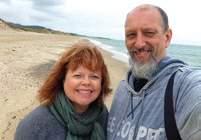
Anastasia Nikitina and Gleb Kapelka
The couple met after moving from their native Latvia to study in Wolverhampton.
“Gleb was the first person I spoke to from University, and he helped me find a room to rent when I arrived in 2008,” says Ana, a BSc (Hons) Business and Finance graduate.
Gleb, who graduated in 2009 with a BSc (Hons) Business and Marketing, is a principal IT consultant, while Anastasia is a finance co-ordinator and personal trainer. The couple have a son, Kevin, and are also foster parents.

A+G A&G SUMMER 2020
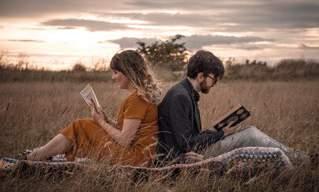

Briony Marshall
The couple were on similar courses, but it was a student night at a “cheesy pop club” where Briony and Liam first met in 2012. and Liam Thornton B+L B&L
Briony, who was in her final The couple, who still live locally, year of her BA (Hons) Creative and got engaged in 2019 and are Professional Writing with English, planning to get married in 2022 – was celebrating a friend’s birthday, ten years after they first met. while Liam, in his second year of a Briony is a retail deputy manager BA (Hons) Drama and Creative and and a published author who is working Professional Writing was marking the on two new novel manuscripts, while success of his play “52” that had just Liam is a front of house manager at finished a run at the Arena Theatre. Birmingham theatre. He also takes
“We met in a conga line to Rock DJ part in local theatre festivals, such by Robbie Williams and the rest, as as Artsfest, and has created a line of they say, is history,” says Briony. storytelling role-playing games (RPGs). R+A R&A
Rachel (née Cooper) and Andrew Carey
Rachel and Andrew met in the first few weeks of the first term of their HND Applied Biology course in September 1991.
Friends for two years, the pair became a couple when Rachel split up from her boyfriend in the Easter of 1993. They’ve been inseparable since and both completed their degrees, Rachel being awarded a BSc (Hons) Biological Sciences and Andrew attaining a BSc (Hons) Biochemistry, in 1995.
They both went on to study for their Master’s degrees elsewhere and moved to Hampshire, where Andrew is from.
After 20 years together, they married at at Blists Hill Victorian Town, near Ironbridge, in April 2013.
GRADUATE’S GOT TALENT!
How do you go from volunteering at UNICEF to managing a dance crew in Myanmar – and then stepping on the America’s Got Talent stage? Graduate Kyaw Si Thu Htun tells WLV Life how he made the unexpected step change.

There’s one thing we can surely all agree on: University of Wolverhampton graduates are talented people. But how many can say they’ve been on the TV show America’s Got Talent?
Kyaw Si Thu Htun can.
A freelance translator and English tutor, he was also a volunteer at UNICEF Myanmar’s Youth initiative programme U-Report, a social media platform for young people, when he started his Business Management degree at Victoria University College, one of the University’s partner institutes in Myanmar.

As Media Focal for U-Report, Si Thu organised a 10-strong media team and managed more than 20 volunteers. It was a challenging role, but one he excelled at – so much so that he continued to volunteer after graduating in 2018 and starting work at a tech start-up.
It was November 2018 when his career took an unexpected turn.
He was first introduced to Junior Creative Dance Crew, a group of young dancers who had recently won the television show Myanmar’s Got Talent and who had been invited to perform in the Union Parliament for World Children’s Day.
Si Thu media-managed the event and the dancers were so impressed with him that they asked him to be their manager when they were invited to take part in America’s Got Talent: the Champions Season 2 in 2019.
He takes up the story: “It’s safe to say I cannot dance at all, but I do know about management. My responsibilities

regarding America’s Got Talent were enormous. Since none of the members are English speaking, I had to be the main communicator between my crew and the AGT producers, and on stage as well. I also had to deal with the paperwork process. It was really a lifechanging experience.”
Although Junior Creative did not advance to the semi-final, the crew received a welcome fit for heroes on their return home to Myanmar. They were regarded as national’s honorable youths by their fans and by their fellow countrymen and were lauded by parliamentarians and celebrities.
Si Thu believes his career success so far is thanks to his Business Management studies.
“I had my HND in 2016 and had practical knowledge working with the UNICEF but it still wasn’t enough for me to choose any full-time career because I believed myself to be still lacking of logical knowledge and wasn’t confident enough to pursue a full-time job,” he said. “In my country, everything requires a degree. So when I started doing my degree studies, it was more than just studying the modules. Combining with my experiences volunteering at U-Report, I had a clear understanding of how organisations work and what it needs to be done in terms of business management.
“Even though I was volunteering for a social innovation programme, the working system was very organised and required professionalism and my degree studies, which encouraged me to think critically, helped me feel more confident with my work then and now with my full-time work, as manager for Junior Creative.”










